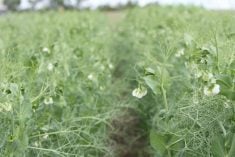Psst, did you hear that canola had a hand in causing mad cow disease?
Oh yeah, I read it on the internet.
The web is a useful, legitimate research tool, but also an unregulated forum where outlandish hogwash can be widely circulated.
If you doubt me, type the words “mad cow” and “canola” into a search engine and see what turns up.
You’ll get dozens of references to a book by John Thomas called Young Again: How to Reverse the Aging Process.
Read Also

Phosphate prices to remain high
Phosphate prices are expected to remain elevated, according to Mosaic’s president.
The same information appears on some alternative health websites.
People who like conspiracy theories latch onto this stuff and e-mail it to their friends.
It’s a case of a little knowledge being a dangerous thing.
Thomas claims, among other things, that canola was created by genetic engineering, that canola is a poisonous plant that insects won’t eat, and that there is some connection between mad cow disease in Britain and feeding cattle rapeseed oil.
Also, he claims that mustard gas used in the First World War was made from mustard seed oil.
I know little about Thomas, other than he lives in the United States and has a lot of incorrect information in his book.
Here are the facts:
Rapeseed has been cultivated for centuries and is still a popular vegetable oil in China and India.
Canadian scientists, using traditional selection and cross-breeding, turned rapeseed into what we call canola. They virtually eliminated the high erucic acid levels that were a concern in rape oil and lowered the glucosinolates in the meal that were a problem for livestock.
If insects won’t eat canola, tell that to flea beetles, diamond back moths and seed pod weevils.
The battle against mad cow disease is focused on eliminating ruminant animal protein from ruminant diets. Part of the solution is to feed vegetable protein such as canola meal.
Mustard gas is a synthetic chemical composition that got its name from its mustard-like odor.
Should farmers be concerned about such attacks on canola? Yes and no. If you hear such misinformation, direct the source to the Canola Council of Canada’s website www.canola-council.org, which has a point-by-point response to Thomas’s claims.
But also take comfort. Thomas’s attack is definitely from the fringe. He also thinks the electrical energy “radiating from computer terminals and fluorescent lights” is dangerous and that you should wear a magnet over your thymus gland.














